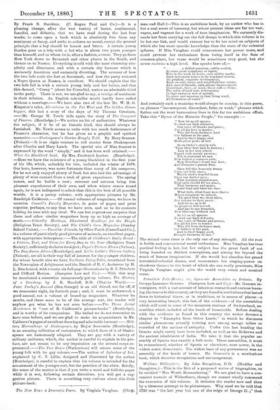William Wilberforce. By John Stoughton, D.D. (Hodder and Stoughton.)—This is
the first of a proposed series of biographies, to be entitled "Men Worth Remembering." We are glad to have a con- venient memoir of Wilberforce, though we cannot wholly commend the execution of this volume. It irritates the reader now and then by a tiresome attempt to be picturesque. Wby need we be told that 1759 was " the last year but one of the reign of George IL ;" that
" two or three weeks before the birth of Wilberforce, the English people `despaired, triumphed, and wept,' over the death of Wolfe ;" and that Wimbledon was "an aristocratic neighbourhood, with re- mains of Roman barrows on the Common, destined to be known as a place for fighting duels, before it attained its present celebrity
for Volunteer encampments ?" Still, the life has substantial merits. The writer is in thorough accord and sympathy with the cbjects and feelings of the great man whom he describes, and his book fills up, in a way, a vacant place. Together with this book we may mention William Lloyd Garrison and his Times. By Oliver Johnson, frith an Introduction by J. G. Whittier. (Boston, U.S., B. B. Russell ; London, Trilbner.)—This is a copious and interesting record of the efforts with which Garrison and his asso- ciates took up in America the work which Wilberforce and Clarkson and the English Abolitionists had nearly brought to an end in this country. There is much that we do not care to read about,—the difference between the gradual Abolitionists and the immediatists, for instance, and the demerits of the emigration party. Mr. Johnson seems to be a little bard on those who differed from Garrison's views and might learn something from the gentleness and consideration which J. G. Whittier, himself as fervent and successful a labourer in the cause as any, shows in his introduction. After all, immediate abolition was the work of the sword, and of a sword which was not drawn for that object, but found that the readiest way to its own end.







































 Previous page
Previous page